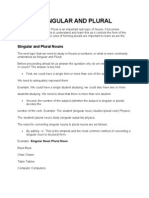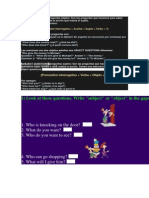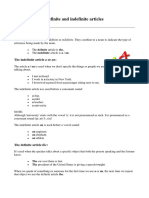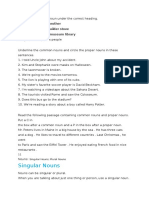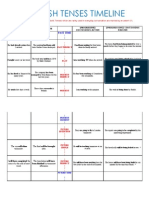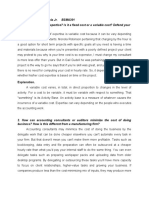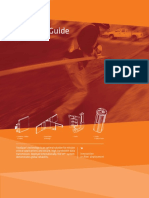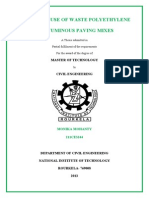100%(1)100% found this document useful (1 vote)
122 viewsQUANTIFIERS
QUANTIFIERS
Uploaded by
GRECIA SAMANTHA ROSALES HERNANDEZQuantifiers are words used to indicate quantity without stating an exact number. Common quantifiers include many, few, a few, much, little, a little, some, any, and enough. Few/little indicate an insufficient amount, while a few/a little indicate enough but not a lot. Some is used with positive statements and questions expecting a positive answer, while any is used with negatives and questions. Enough describes having or not having the right amount of something.
Copyright:
© All Rights Reserved
Available Formats
Download as PPT, PDF, TXT or read online from Scribd
QUANTIFIERS
QUANTIFIERS
Uploaded by
GRECIA SAMANTHA ROSALES HERNANDEZ100%(1)100% found this document useful (1 vote)
122 views12 pagesQuantifiers are words used to indicate quantity without stating an exact number. Common quantifiers include many, few, a few, much, little, a little, some, any, and enough. Few/little indicate an insufficient amount, while a few/a little indicate enough but not a lot. Some is used with positive statements and questions expecting a positive answer, while any is used with negatives and questions. Enough describes having or not having the right amount of something.
Original Title
QUANTIFIERS (1).ppt
Copyright
© © All Rights Reserved
Available Formats
PPT, PDF, TXT or read online from Scribd
Share this document
Did you find this document useful?
Is this content inappropriate?
Quantifiers are words used to indicate quantity without stating an exact number. Common quantifiers include many, few, a few, much, little, a little, some, any, and enough. Few/little indicate an insufficient amount, while a few/a little indicate enough but not a lot. Some is used with positive statements and questions expecting a positive answer, while any is used with negatives and questions. Enough describes having or not having the right amount of something.
Copyright:
© All Rights Reserved
Available Formats
Download as PPT, PDF, TXT or read online from Scribd
Download as ppt, pdf, or txt
100%(1)100% found this document useful (1 vote)
122 views12 pagesQUANTIFIERS
QUANTIFIERS
Uploaded by
GRECIA SAMANTHA ROSALES HERNANDEZQuantifiers are words used to indicate quantity without stating an exact number. Common quantifiers include many, few, a few, much, little, a little, some, any, and enough. Few/little indicate an insufficient amount, while a few/a little indicate enough but not a lot. Some is used with positive statements and questions expecting a positive answer, while any is used with negatives and questions. Enough describes having or not having the right amount of something.
Copyright:
© All Rights Reserved
Available Formats
Download as PPT, PDF, TXT or read online from Scribd
Download as ppt, pdf, or txt
You are on page 1of 12
QUANTIFIERS
Quantifiers are words that
are used to state quantity or
amount of something
without stating the exact
number.
Countable Nouns
many I don't have many
apples.
few* We know few
people in the area.
I would like to get to know
more.
a few** We know a few people in
the area. I know enough
people to keep me happy.
Uncountable Nouns
Much I don't have much
money.
little* I know little English.
I am going to have a
problem getting around
England.
a little** I know a little English, at
least enough to get to
England.
*few/little - means that is not
enough of something.
** a few /a little - means that
there are not a lot of something,
but there is enough.
Some and any
Some and any can be used when:
The exact number is not known.
The exact number is not important or
relevant.
Some and any are used with
countable nouns and
uncountable nouns
Any
Any is used with:
Negative sentences
When asking a question.
Do you have any ice cream left?
I don't have any money today. I am getting paid on
Friday.
Some
Some is used with:
Positive sentences. When asking a question, if
the answer is expected to be positive or not
relevant or you are offering something.
The children have some free time.
Please buy some bananas.
Can I have a glass of tea?
Would you like some cake?
fill in the gaps with one of the
following determiners: Some, Any
1) Ann has _________candies.
2) Bill doesn't have _________money.
3) Sue will give us _________information .
4) There is _____________ milk in the fridge.
5) There isn't ________________beer.
enough
• We use enough to describe the effects of
having / not having the right amount of
something.
“John isn’t patient enough to work as a teache
r.”
“The dress isn’t big enough.”
enough
• Enough can be used before a noun to
mean “all that is necessary”.
“I don’t drink enough water. ”
“Do you eat enough vegetables?”
“My brother doesn’t do enough
exercise.”
You might also like
- Adolescence Developmental Breakdown A Psychoanalytic View (Moses Laufer, M. Egle Laufer)Document242 pagesAdolescence Developmental Breakdown A Psychoanalytic View (Moses Laufer, M. Egle Laufer)Lena MoralesNo ratings yet
- Simple Present Tense PowerPointDocument21 pagesSimple Present Tense PowerPointRick ComprasNo ratings yet
- WP Integrating Active Directory MLDocument14 pagesWP Integrating Active Directory MLFarid BouNo ratings yet
- Grammar Meets Conversation Do Does Did Are Is Was Fun Activities Games - 2965Document3 pagesGrammar Meets Conversation Do Does Did Are Is Was Fun Activities Games - 2965Yendy GutierrezNo ratings yet
- Regular Verbs ListDocument7 pagesRegular Verbs ListYolandaNo ratings yet
- The Present of Be: Statements,: Negatives andDocument19 pagesThe Present of Be: Statements,: Negatives andSirikan Sriwisan100% (1)
- NounsDocument5 pagesNounsMohd ZulfadliNo ratings yet
- Collective NounsDocument4 pagesCollective NounsSakuralina NizamNo ratings yet
- Elementary Was Were ExercisesDocument5 pagesElementary Was Were ExercisesjcllanoscortezNo ratings yet
- Forming Questions in EnglishDocument4 pagesForming Questions in EnglishIqi IqahNo ratings yet
- 7 Grammar Rules You Need To GeDocument7 pages7 Grammar Rules You Need To GeHarpreet SinghNo ratings yet
- AdjectivesDocument51 pagesAdjectivesSakshi100% (1)
- Unit 7-Present Perfect and Simple PastDocument9 pagesUnit 7-Present Perfect and Simple PastĐỗ Ngọc Mỹ NhiNo ratings yet
- Subject QuestionsDocument9 pagesSubject QuestionsMaría VeljimNo ratings yet
- Adverbs and AdjectivesDocument3 pagesAdverbs and Adjectivesquynhchi50% (2)
- A An TheDocument27 pagesA An TheKristen MuñozNo ratings yet
- ApostrophesDocument1 pageApostrophesLaura Uli SiahaanNo ratings yet
- Past Simple and Past ContinuousDocument2 pagesPast Simple and Past ContinuousJuan ValbuenaNo ratings yet
- 1definite and Indefinite Articles PDFDocument5 pages1definite and Indefinite Articles PDFgnomonicoNo ratings yet
- GERUNDS and INFINITIVESDocument11 pagesGERUNDS and INFINITIVESDMaliez0% (1)
- English For Everyone - Level 1 Beginner - Course B - 231211 - 135147Document8 pagesEnglish For Everyone - Level 1 Beginner - Course B - 231211 - 135147Fatima-Zahra arroubNo ratings yet
- Tense Revision EnglishDocument4 pagesTense Revision EnglishBrian DimechNo ratings yet
- Countable and Uncountable NounsDocument5 pagesCountable and Uncountable NounsCarmen Elena CarteșNo ratings yet
- 16 TensesDocument1 page16 TensesSyafiq Alan NaufaNo ratings yet
- Singular Nouns: Exercise 2Document12 pagesSingular Nouns: Exercise 2psycho_psychoNo ratings yet
- Possessive PronounsDocument10 pagesPossessive PronounsJacob OdgonNo ratings yet
- PronounsDocument5 pagesPronounsDéboraFernandesNo ratings yet
- If Clause Type 3Document20 pagesIf Clause Type 3fajar sukmanaNo ratings yet
- Grammar Modals Have To Must Don't Have To Mustn'tDocument10 pagesGrammar Modals Have To Must Don't Have To Mustn'tHüseyin KurtNo ratings yet
- UNIT 13 Unreal TimeDocument20 pagesUNIT 13 Unreal TimeRaquel García IglesiasNo ratings yet
- Types of SentencesDocument13 pagesTypes of SentencesTanya TkachukNo ratings yet
- Modal VerbsDocument30 pagesModal VerbsGemma Castillo100% (1)
- Past ModalsDocument2 pagesPast ModalsTijana DoberšekNo ratings yet
- Past Simple Affirmative, Negative and Interrogative FormDocument16 pagesPast Simple Affirmative, Negative and Interrogative FormManuel Alejandro Reyes GalindoNo ratings yet
- Screenshot 2023-05-01 at 23.14.54 PDFDocument21 pagesScreenshot 2023-05-01 at 23.14.54 PDFiryna myskivNo ratings yet
- Stative Vs Dynamic VerbsDocument11 pagesStative Vs Dynamic VerbscamilapepaNo ratings yet
- Look at Each Answer and Complete Each Question With The Correct WordDocument2 pagesLook at Each Answer and Complete Each Question With The Correct WordLeoNo ratings yet
- Gerunds: Gerund As SubjectDocument4 pagesGerunds: Gerund As SubjectbumfromjerseyNo ratings yet
- Ao5 Unit 9 QuantifiersDocument15 pagesAo5 Unit 9 Quantifiersapi-240618645100% (1)
- English TensesDocument13 pagesEnglish Tenseslog1alexNo ratings yet
- The Position of The Adverb in A SentenceDocument6 pagesThe Position of The Adverb in A SentencesheNo ratings yet
- The Present Simple: "-S" and "-Es" EndingsDocument7 pagesThe Present Simple: "-S" and "-Es" EndingsMuhammad Hafidh Sufli100% (1)
- Nouns To Verbs 30034 SDocument2 pagesNouns To Verbs 30034 SPaul GalanNo ratings yet
- NEW Total English: Elementary LevelDocument15 pagesNEW Total English: Elementary LevelEduardo Israel Sanchez Ayala100% (1)
- English 4 Spec Old CopybookDocument104 pagesEnglish 4 Spec Old CopybookЕкатерина СамсыкаNo ratings yet
- Past PerfectDocument4 pagesPast PerfectManolo Galvez100% (1)
- All You Ever Wanted To Know About .: Personal, Subject, Object, Possessive, Reflexive, and IndefiniteDocument30 pagesAll You Ever Wanted To Know About .: Personal, Subject, Object, Possessive, Reflexive, and IndefiniteRaito LurusNo ratings yet
- English Grammar RevisionDocument8 pagesEnglish Grammar RevisionStorageNo ratings yet
- Sentence Structure EnglishDocument27 pagesSentence Structure Englishtannguyenvan100% (5)
- This That These Those 1Document17 pagesThis That These Those 1Muhammad NuhNo ratings yet
- Adjectives Lesson 5Document20 pagesAdjectives Lesson 5Jason CastilloNo ratings yet
- English Tense Timeline QuerformatDocument3 pagesEnglish Tense Timeline QuerformatqkhaiproNo ratings yet
- Second ConditionalDocument8 pagesSecond ConditionalManuel SanchezNo ratings yet
- Definite Article The/ Zero ArticleDocument3 pagesDefinite Article The/ Zero ArticleurielNo ratings yet
- PAST SIMPLE Present PerfectDocument10 pagesPAST SIMPLE Present PerfectDesislava YordanovaNo ratings yet
- Appearance and Personality ActivitiesDocument2 pagesAppearance and Personality ActivitiesFirstClass IdiomesNo ratings yet
- Past Continuous TenseDocument2 pagesPast Continuous TenseceriaNo ratings yet
- Forming Nouns and Adjectives Derived From VerbsDocument6 pagesForming Nouns and Adjectives Derived From VerbsBeri DarioNo ratings yet
- TAG QUESTION PresentationDocument6 pagesTAG QUESTION PresentationSergio SuarezNo ratings yet
- QuantifiersDocument22 pagesQuantifiersDevansh SharmaNo ratings yet
- Quantifiers 1 - 1Document2 pagesQuantifiers 1 - 1Natalia NatividadNo ratings yet
- Sabroso Dulce Picante Agrio Delicioso Amargo Asqueroso Crujiente Soso SaladoDocument1 pageSabroso Dulce Picante Agrio Delicioso Amargo Asqueroso Crujiente Soso SaladoGRECIA SAMANTHA ROSALES HERNANDEZNo ratings yet
- Grecia R. Applicant Atlahuilco, Veracruz. Postal CodeDocument1 pageGrecia R. Applicant Atlahuilco, Veracruz. Postal CodeGRECIA SAMANTHA ROSALES HERNANDEZNo ratings yet
- The Comparative and Superlative Adjectives: Liam Is Taller Than HelenDocument1 pageThe Comparative and Superlative Adjectives: Liam Is Taller Than HelenGRECIA SAMANTHA ROSALES HERNANDEZNo ratings yet
- Universidad Del Valle de OrizabaDocument2 pagesUniversidad Del Valle de OrizabaGRECIA SAMANTHA ROSALES HERNANDEZNo ratings yet
- Vocabulary: Money: 1. Check Your Vocabulary: Picture MatchingDocument2 pagesVocabulary: Money: 1. Check Your Vocabulary: Picture MatchingGRECIA SAMANTHA ROSALES HERNANDEZNo ratings yet
- Comparative and Superlative FromsDocument1 pageComparative and Superlative FromsGRECIA SAMANTHA ROSALES HERNANDEZ50% (2)
- Maneco Midterm TPDocument2 pagesManeco Midterm TPAgapito Jr LamelaNo ratings yet
- Samsung EcobubbleDocument840 pagesSamsung EcobubbleAlinaNo ratings yet
- Preface: SevenDocument60 pagesPreface: Seven24.Mr.Theutthavy Pms 7/6No ratings yet
- List of Abbreviations: On A/C AllDocument64 pagesList of Abbreviations: On A/C AllDaryl fionnNo ratings yet
- Boq - From City Experts Contg. Boq's Villa Modification WorksDocument27 pagesBoq - From City Experts Contg. Boq's Villa Modification WorksARUL SANKARAN100% (1)
- Paref Springdale School: Info - Office@parefspringdale - Edu.phDocument7 pagesParef Springdale School: Info - Office@parefspringdale - Edu.phFerminNo ratings yet
- Guia TeraSpanDocument73 pagesGuia TeraSpanTim Robles MartínezNo ratings yet
- Planning: Planning Analysis Design ImplementationDocument4 pagesPlanning: Planning Analysis Design ImplementationRazmen Ramirez PintoNo ratings yet
- Module 3 PDFDocument6 pagesModule 3 PDFHeart Erica AbagNo ratings yet
- Sailing Home Sheet UpdatedDocument6 pagesSailing Home Sheet UpdatedRosina RobertNo ratings yet
- Inguinal HerniaDocument7 pagesInguinal HerniaNader Smadi67% (6)
- Plato Charmides. Translated With Introdu PDFDocument8 pagesPlato Charmides. Translated With Introdu PDFdonwea25No ratings yet
- Qualifying List HecwDocument6 pagesQualifying List Hecwapi-120111658No ratings yet
- Javascript - Javascript Tutorial: Javascript Tutorials Is One of The Best Quick Reference To The Javascript. in ThisDocument39 pagesJavascript - Javascript Tutorial: Javascript Tutorials Is One of The Best Quick Reference To The Javascript. in ThisAdeeti Chopra SNo ratings yet
- FRANC3D V7 Training - Part 9 - Session LogDocument3 pagesFRANC3D V7 Training - Part 9 - Session LogsanthoshnlNo ratings yet
- 9781315858715Document566 pages9781315858715Priyanka Krishna100% (1)
- Priminer U400Document7 pagesPriminer U400Metodos E ProcessosNo ratings yet
- 6A Good and Bad HabitsDocument12 pages6A Good and Bad HabitsSapphire BreezeNo ratings yet
- Ce Liu PHD ThesisDocument4 pagesCe Liu PHD Thesisfjfyj90y100% (2)
- Africanus Journal Volume 2 No. 1Document72 pagesAfricanus Journal Volume 2 No. 1Gordon-Conwell Theological SeminaryNo ratings yet
- Mirza Ali Hassan (Surveyor) CVDocument2 pagesMirza Ali Hassan (Surveyor) CVHR Agha SteelNo ratings yet
- PD 1096 - Basic LawDocument1 pagePD 1096 - Basic Lawhannah marvillaNo ratings yet
- A Study On Use of Waste Polyethylene in Bituminous Paving MixingDocument106 pagesA Study On Use of Waste Polyethylene in Bituminous Paving Mixingpraveen100% (1)
- Servlet Config and ContextDocument64 pagesServlet Config and ContextAmitKumarNo ratings yet
- UNIT 1. MY NEW SCHOOL - GLOBAL 6-KEYS-2024Document9 pagesUNIT 1. MY NEW SCHOOL - GLOBAL 6-KEYS-2024thanhhuyen84bmtNo ratings yet
- ORGANIC ChemistryDocument17 pagesORGANIC ChemistrySadaf SubhaniNo ratings yet
- 4281 - 03 Stiffened Shear WebDocument26 pages4281 - 03 Stiffened Shear WebAndrew GilbrideNo ratings yet
- Amiya MohapatraDocument17 pagesAmiya MohapatraBhavesh PopatNo ratings yet






